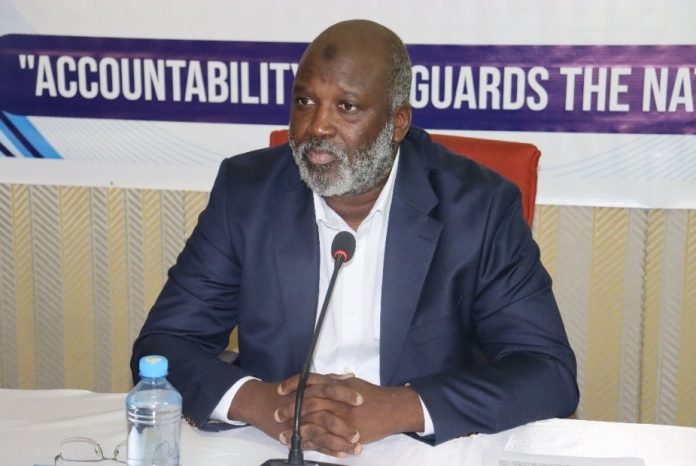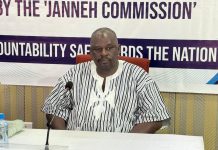By Kebba AF Touray
The former Attorney General and Minister of Justice, Abubacarr M. Tambadou, on Friday denied claims of conflict of interest in the work of the Janneh Commission regarding the Social Security and Housing Finance Corporation (SSHFC).
Tambadou continued his testimony on September 19, 2025, at the National Assembly before the inquiry into the sale and disposal of assets identified by the Janneh Commission as properties of former President Yahya A.J.J. Jammeh.
Allegations of conflict of interest surfaced during the commission’s inquiry into SSHFC. Its first secretary, Mr. Alagie Kurang, said he petitioned against Lead Counsel Amie Bensouda because of her potential conflict in handling the SSHFC proceedings.
The committee played a video of the Janneh Commission showing Bensouda questioning the former Managing Director of SSHFC. After the footage, the chair, Hon. Abdoulie Ceesay, asked Tambadou whether it was proper for Bensouda to probe SSHFC.
Tambadou responded: “Lead Council declared a potential conflict of interest to me and recused herself, after which I appointed Musa Batchilly to cover Social Security, the Social Security part of the proceedings.”
He said the issue of conflict depends on the facts and the timing. “Assuming that Mr. Graham was Managing Director at a time when Councilor Bensouda was also retained by Social Security as counsel, now I could see conflict, potential conflict arising by this act, by Councilor Bensouda leaving Mr. Graham’s evidence as it happened,” he said.
“But if Counsel Bensouda was not retained as counsel for Social Security at the time when Mr. Graham was Managing Director, then it’s not very clear again, and you can’t say there was conflict or not,” he added.
“I am not convinced that this would amount to conflict at this stage, simply because we are dealing with a situation where I don’t know if Counsel Bensouda was retained by Social Security at the time when Mr. Graham was Managing Director,” he told the committee.
Tambadou stressed that once Bensouda was engaged in June 2017, and Social Security was probed by the commission, “when staff who were either managers or the Managing Director of Social Security were being called, she did not take part in that probing. Another lawyer was assigned to take part.”
Ceesay then asked: “So at what point did Counsel Bensouda inform you about potential conflict. Is it before Graham’s testimony or after that?”
Tambadou replied: “I wouldn’t be sure about the dates, because it was not something that was at the time significant to me, for me to keep track of the dates in any event, as I was not a keen follower of the commissions.”
Counsel Aji Saine Kah shifted to the issue of properties, asking if Tambadou was aware of eviction notices given to the Registrar General, Alieu Jallow, to conduct evictions.
“I was aware that he was serving eviction notices to properties that had occupants,” Tambadou confirmed.
Kah pressed further: “Apart from serving notices, did he inform you that he didn’t actually evict some of the occupants of these properties?”
Tambadou replied: “I wouldn’t be surprised if he did, because the notices should be followed by implementation. I don’t recall specific reports to me that they are evicting people, but I expected that to occur as a matter of course.”
Kah told him that Jallow had evicted the family members of the former President from his mother’s home in Kotu, but because he felt sorry for them, he lodged them in another property that was also part of the commission’s work, against the instruction of the Ministry of Justice.
“Were you aware of this?” Kah asked.
Tambadou said he was not aware. “Mr. Jallow would have been a victim of Gambianess, which happens to all of us. I guess he was swayed by humanitarian reasons. Well, I’m sure he felt sympathetic to the family. These things happen. We’re all Muslims and Christians in this country. Sometimes, the soft side of you gets the better of you. That’s why it’s difficult and complex to work as a politician in this country. It’s extremely difficult.”
Tambadou also addressed the eviction notice served on Ms. Aisha Fatty, who occupied a property believed to belong to General Sulayman Badjie. He said Jallow reported that Ms. Fatty brandished a letter with the letterhead of the Gambian National Army.
Jallow was not convinced by the letter and intended to proceed with the eviction, but Tambadou intervened. “So, I told him not to do so. I instructed him not to do so,” he said.
Explaining his decision, Tambadou said the first reason was a call from Ms. Fatty’s lawyer, Mr. Abdoullahi Sisaho. “He informed me that Ms. Fatty is claiming title to the property and that he would send correspondence with proof of that title to me. I have to consider that. So, that was the first reason.”
The second reason, he said, was the letter with the army letterhead. “Now, out of respect for the institution of the Army, because I do not yet, at that point in time, know the contents of that letter, but I wouldn’t summarily dismiss a letter from either the Army or any other armed or security services in this country, out of respect for their institutions. So that’s why Mr. Jallow was told to delay the implementation of the eviction notice.”



















